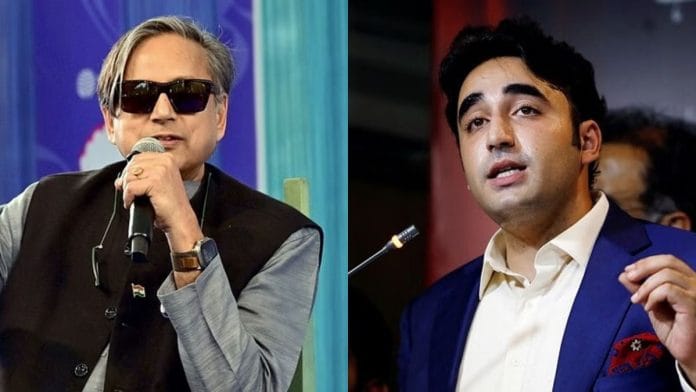New Delhi: In a rapid diplomatic counter to India’s global outreach following Operation Sindoor, Pakistan has announced a high-profile delegation to Western capitals, led by Pakistan People’s Party Chairman Bilawal Bhutto Zardari. Pakistanis are ecstatic. They have complete faith in Zardari’s English. Some enthusiastic ones are even calling for a Tharoor vs Zardari debate on Kashmir, strictly in English.
The Pakistani delegation will visit London, Washington, Paris, and Brussels with a stated aim to counter what Islamabad calls “Indian propaganda” and present its narrative following the 10 May ceasefire agreement along the Line of Control (LoC).
“Announcement of an English speaking competition on Kashmir between Pakistan, Bilawal Bhutto and India, Shashi Tharoor,” an X user Tahir Malik, who identifies as a free thinker, wrote.
Then there were the memes. One imagined Zardari’s reaction—a popular video of him saying “itne beghairat ho” (you are so impudent)—if confronted by Indian journalist Barkha Dutt.
According to the Pakistan Prime Minister’s Office, the initiative is part of a broader effort to “expose India’s conspiracies and efforts to destabilise regional peace.” Prime Minister Shehbaz Sharif personally asked Zardari to lead the mission, which aims to present a unified front abroad.
The delegation comprises several prominent political and diplomatic figures: Dr Musadik Malik (Minister for Climate Change), Khurram Dastgir Khan (former foreign minister), Senator Sherry Rehman, Hina Rabbani Khar (former minister of state for foreign affairs), Faisal Subzwari (politician), Tehmina Janjua (former foreign secretary), and Jalil Abbas Jilani (former caretaker foreign minister).
Despite the fanfare, questions persist over Islamabad’s diplomatic coherence. Zardari himself has faced criticism for previously inflammatory remarks, including a statement following India’s suspension of the Indus Waters Treaty in which he said, “Either water will flow through the Indus or their blood.” He later walked back the comment, focusing rather on Pakistan’s willingness to pursue peace.
On Friday, Prime Minister Sharif appeared to strike a more conciliatory note, urging dialogue with India. “We are there forever as neighbours,” he said. “We have fought three wars that solved nothing… the lesson is that we have to sit down at the table like peaceful neighbours.”
Also read: Bilawal Bhutto just gave Pakistanis more meme material on him. And this time, he knows it
Spotlight on Bilawal
Pakistan’s response is seen as a direct tit-for-tat—swift, symbolic, and strategic. Whether this latest diplomatic campaign can shift international perception remains to be seen—but in Pakistan, the spotlight is firmly on Zardari.
“Bilawal Bhutto-Zardari has been requested by PM Shehbaz Sharif to lead a delegation to present Pakistan’s case for peace on the international stage. Excellent choice and initiative,” Dawn columnist Nadeem Farooq Paracha wrote on X.
Others agree.
“Irrespective of any partisan opinions and criticism, this inclusive gesture can serve as the baby step towards un-interrupted terms and democracy,” a Pakistani entrepreneur Shehram pointed out on X.
Still, for many Pakistanis, the selection of Zardari, a polished Oxford-educated politician with a flair for rhetoric, was less about diplomacy and more about drama. They are convinced the representation is unequal.
“Delegation should have all parties, provinces share,” Pakistani X user Khalid wrote.
In a debate on Samaa TV, a Pakistani news channel, professor and columnist Rasool Bakhsh Rais— in a panel along with Professor Hasan Askari, journalist Salman Ghani, columnist Khwaja Imran Raza— said that Bilawal along with Khar and Jilani can do a fruitful job in presenting Pakistan’s side to the world. He also argued that while two of them are from PPP, Pakistanis should not focus on why a particular party has more members.
“He is quite capable, so is Khar. It is more important to have speakers who can present Pakistan’s side eloquently than debate about which party could have more delegates,” he added.
(Edited by Theres Sudeep)






